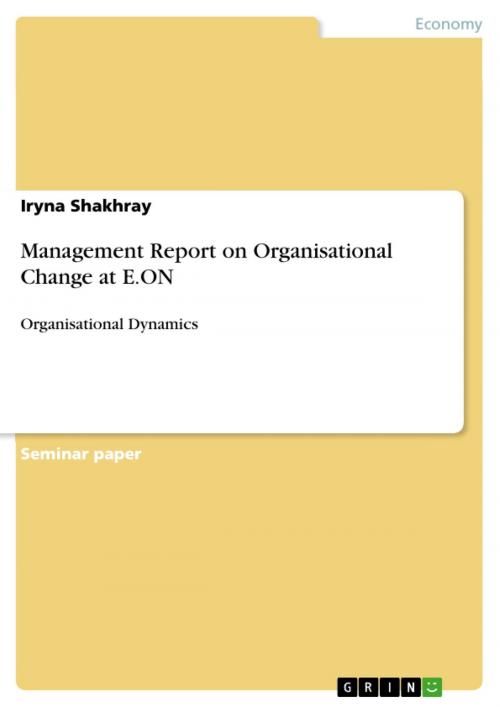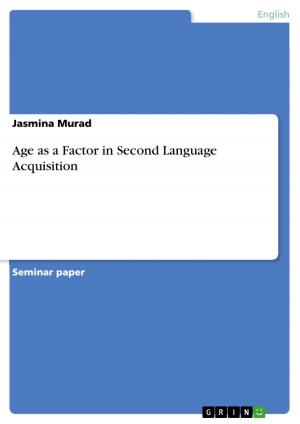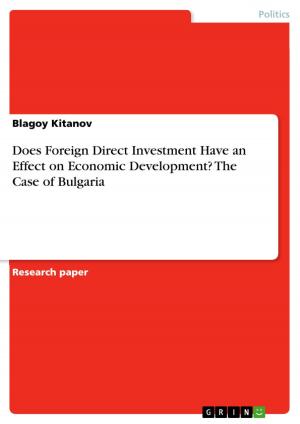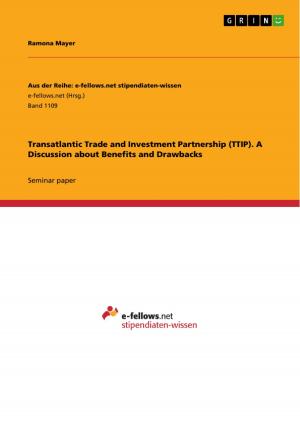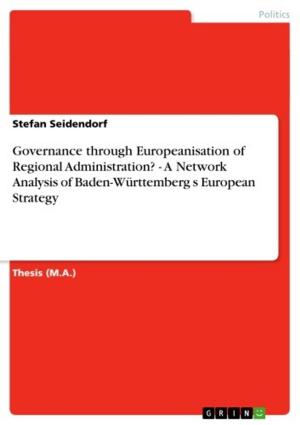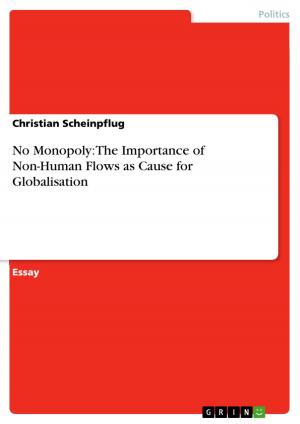Management Report on Organisational Change at E.ON
Organisational Dynamics
Business & Finance, Management & Leadership, Management| Author: | Iryna Shakhray | ISBN: | 9783640241613 |
| Publisher: | GRIN Publishing | Publication: | January 13, 2009 |
| Imprint: | GRIN Publishing | Language: | English |
| Author: | Iryna Shakhray |
| ISBN: | 9783640241613 |
| Publisher: | GRIN Publishing |
| Publication: | January 13, 2009 |
| Imprint: | GRIN Publishing |
| Language: | English |
Seminar paper from the year 2008 in the subject Business economics - Business Management, Corporate Governance, grade: C, University of Derby (University), course: Organisational Dynamics (HRM), 11 entries in the bibliography, language: English, abstract: Organisations are part of a constantly changing, continuous progressing complex business world. According to Nikolenko and Kleiner (1996), they are also subject to internal and external influences, e.g. global trends, strategy, environmental conditions, organisational culture and leadership etc. The most important of them are the development of the global market, increasing competition, ever faster changing economic and technological development and a diverse workforce. In order to be able to compete, to advance and become successful in the global marketplace, organisations should respond to change in the face of environmental pressure (Lakomski, 2001). However, it is not enough to recognize the need for change but more important is to implement change successfully. Nikolenko and Kleiner in their Global trends in organizational design (1996) state that in response to these factors, three new forms of organisation structure have emerged, which are expected to adequately meet the constant change of the world. Some organisations have created a network, whose core has been formed by mergers, alliances and acquisitions of large firms' groups (Castells, 2000 cited in Lemoine & Dagneas 2003). Lemoine and Dagneas (2003) write in their research that the net is still in a constant development. Many individual smaller firms or groups of firms join or leave the net; the legal arrangements develop interminable, and changes in the net are the normal occurrence, rather than the exception. Early 2000s, the head of the network of transport and logistics services providers was the corporation E.ON, which initiated its activities by the merger of two large corporations: Veba AG and Viag; the aim was to create a company that will stand a chance for development in the global marketplace. This management report will identify a structure of a company, describe its culture and culture of the country, where the company is situated, show the nature of changes that took place at E.ON, name reasons for possible resistance for those particular changes.
Seminar paper from the year 2008 in the subject Business economics - Business Management, Corporate Governance, grade: C, University of Derby (University), course: Organisational Dynamics (HRM), 11 entries in the bibliography, language: English, abstract: Organisations are part of a constantly changing, continuous progressing complex business world. According to Nikolenko and Kleiner (1996), they are also subject to internal and external influences, e.g. global trends, strategy, environmental conditions, organisational culture and leadership etc. The most important of them are the development of the global market, increasing competition, ever faster changing economic and technological development and a diverse workforce. In order to be able to compete, to advance and become successful in the global marketplace, organisations should respond to change in the face of environmental pressure (Lakomski, 2001). However, it is not enough to recognize the need for change but more important is to implement change successfully. Nikolenko and Kleiner in their Global trends in organizational design (1996) state that in response to these factors, three new forms of organisation structure have emerged, which are expected to adequately meet the constant change of the world. Some organisations have created a network, whose core has been formed by mergers, alliances and acquisitions of large firms' groups (Castells, 2000 cited in Lemoine & Dagneas 2003). Lemoine and Dagneas (2003) write in their research that the net is still in a constant development. Many individual smaller firms or groups of firms join or leave the net; the legal arrangements develop interminable, and changes in the net are the normal occurrence, rather than the exception. Early 2000s, the head of the network of transport and logistics services providers was the corporation E.ON, which initiated its activities by the merger of two large corporations: Veba AG and Viag; the aim was to create a company that will stand a chance for development in the global marketplace. This management report will identify a structure of a company, describe its culture and culture of the country, where the company is situated, show the nature of changes that took place at E.ON, name reasons for possible resistance for those particular changes.
